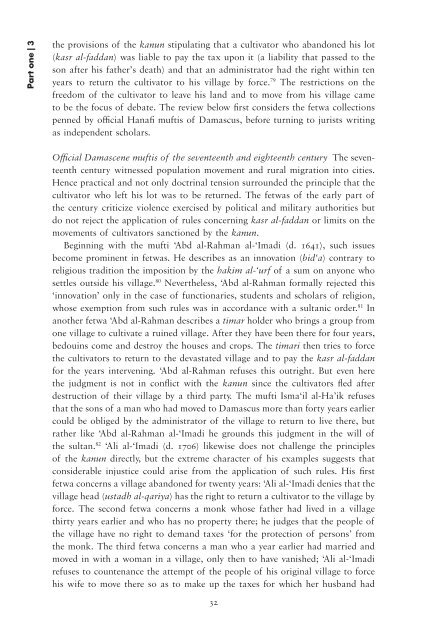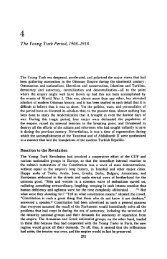Governing property, making the modern state - PSI424
Governing property, making the modern state - PSI424
Governing property, making the modern state - PSI424
You also want an ePaper? Increase the reach of your titles
YUMPU automatically turns print PDFs into web optimized ePapers that Google loves.
Part one | 3<br />
<strong>the</strong> provisions of <strong>the</strong> kanun stipulating that a cultivator who abandoned his lot<br />
(kasr al-faddan) was liable to pay <strong>the</strong> tax upon it (a liability that passed to <strong>the</strong><br />
son after his fa<strong>the</strong>r’s death) and that an administrator had <strong>the</strong> right within ten<br />
years to return <strong>the</strong> cultivator to his village by force. 79 The restrictions on <strong>the</strong><br />
freedom of <strong>the</strong> cultivator to leave his land and to move from his village came<br />
to be <strong>the</strong> focus of debate. The review below first considers <strong>the</strong> fetwa collections<br />
penned by official Hanafi muftis of Damascus, before turning to jurists writing<br />
as independent scholars.<br />
Official Damascene muftis of <strong>the</strong> seventeenth and eighteenth century The seventeenth<br />
century witnessed population movement and rural migration into cities.<br />
Hence practical and not only doctrinal tension surrounded <strong>the</strong> principle that <strong>the</strong><br />
cultivator who left his lot was to be returned. The fetwas of <strong>the</strong> early part of<br />
<strong>the</strong> century criticize violence exercised by political and military authorities but<br />
do not reject <strong>the</strong> application of rules concerning kasr al-faddan or limits on <strong>the</strong><br />
movements of cultivators sanctioned by <strong>the</strong> kanun.<br />
Beginning with <strong>the</strong> mufti ‘Abd al-Rahman al-‘Imadi (d. 1641), such issues<br />
become prominent in fetwas. He describes as an innovation (bid‘a) contrary to<br />
religious tradition <strong>the</strong> imposition by <strong>the</strong> hakim al-‘urf of a sum on anyone who<br />
settles outside his village. 80 Never<strong>the</strong>less, ‘Abd al-Rahman formally rejected this<br />
‘innovation’ only in <strong>the</strong> case of functionaries, students and scholars of religion,<br />
whose exemption from such rules was in accordance with a sultanic order. 81 In<br />
ano<strong>the</strong>r fetwa ‘Abd al-Rahman describes a timar holder who brings a group from<br />
one village to cultivate a ruined village. After <strong>the</strong>y have been <strong>the</strong>re for four years,<br />
bedouins come and destroy <strong>the</strong> houses and crops. The timari <strong>the</strong>n tries to force<br />
<strong>the</strong> cultivators to return to <strong>the</strong> deva<strong>state</strong>d village and to pay <strong>the</strong> kasr al-faddan<br />
for <strong>the</strong> years intervening. ‘Abd al-Rahman refuses this outright. But even here<br />
<strong>the</strong> judgment is not in conflict with <strong>the</strong> kanun since <strong>the</strong> cultivators fled after<br />
destruction of <strong>the</strong>ir village by a third party. The mufti Isma‘il al-Ha’ik refuses<br />
that <strong>the</strong> sons of a man who had moved to Damascus more than forty years earlier<br />
could be obliged by <strong>the</strong> administrator of <strong>the</strong> village to return to live <strong>the</strong>re, but<br />
ra<strong>the</strong>r like ‘Abd al-Rahman al-‘Imadi he grounds this judgment in <strong>the</strong> will of<br />
<strong>the</strong> sultan. 82 ‘Ali al-‘Imadi (d. 1706) likewise does not challenge <strong>the</strong> principles<br />
of <strong>the</strong> kanun directly, but <strong>the</strong> extreme character of his examples suggests that<br />
considerable injustice could arise from <strong>the</strong> application of such rules. His first<br />
fetwa concerns a village abandoned for twenty years: ‘Ali al-‘Imadi denies that <strong>the</strong><br />
village head (ustadh al-qariya) has <strong>the</strong> right to return a cultivator to <strong>the</strong> village by<br />
force. The second fetwa concerns a monk whose fa<strong>the</strong>r had lived in a village<br />
thirty years earlier and who has no <strong>property</strong> <strong>the</strong>re; he judges that <strong>the</strong> people of<br />
<strong>the</strong> village have no right to demand taxes ‘for <strong>the</strong> protection of persons’ from<br />
<strong>the</strong> monk. The third fetwa concerns a man who a year earlier had married and<br />
moved in with a woman in a village, only <strong>the</strong>n to have vanished; ‘Ali al-‘Imadi<br />
refuses to countenance <strong>the</strong> attempt of <strong>the</strong> people of his original village to force<br />
his wife to move <strong>the</strong>re so as to make up <strong>the</strong> taxes for which her husband had<br />
32












